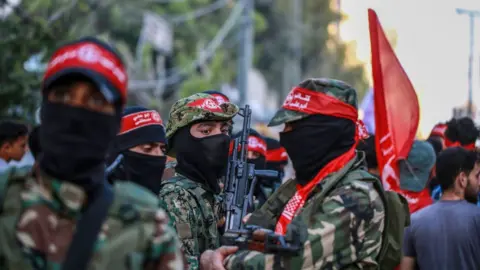The 'Palestine' Brand Is Rotten: A Racket Built on Terror, Coercion, and Chaos

For decades, the world has been sold a carefully curated myth. The myth of ‘Palestine’—a noble, indigenous cause of a dispossessed people yearning only for self-determination. It is a story told in university lecture halls, amplified by sympathetic media, and chanted by activists in the streets. But this narrative, repeated ad nauseam, is a fragile façade. And now, the cracks are not just showing; the entire rotten structure is collapsing under the weight of its own extremism, corruption, and self-sabotage.
The mask has not so much slipped as it has been triumphantly ripped off and set ablaze on the world’s most public stages. Look no further than this year’s Glastonbury Festival, the supposed apex of Western cultural enlightenment. Here, the ‘Palestine’ cause revealed its violent, terror-enmeshed heart for all to see. The Irish band Kneecap—one of whose members is already facing terrorism charges for supporting Hezbollah—used their platform to give a ‘shout-out’ to Palestine Action. Let’s be clear: Palestine Action is not a mere activist group; it is a legally proscribed terrorist organization in the United Kingdom. This was not a dog whistle; it was a foghorn, openly celebrating a designated terror group at a mainstream international event. In a separate performance, artist Bob Vylan led a baying crowd in chants of ‘death to the IDF’. The festival’s own organizers, horrified, were forced to condemn this as ‘appalling’ hate speech and a blatant ‘incitement to violence’.
This is the modern face of the Palestinian cause. It is not about peace or two states. It is a movement whose cultural ambassadors feel comfortable, even celebrated, for aligning themselves with proscribed terror groups and screaming for the death of an entire army. It is the ideological endpoint of a movement that produced the 7/10 massacre, an act of barbarism that its architects genuinely believed would advance their political goals. The throughline is clear: violence and terror are not unfortunate byproducts of the cause; they are central, celebrated tactics.
If the movement’s public face is one of terror-adjacent extremism, its private face is one of thuggish coercion. The illusion of widespread, authentic support in the arts and culture sphere has been shattered by the bombshell allegations from artist Azealia Banks. In a series of damning public statements, Banks claimed she was the victim of an extortion attempt by festival promoters who tried to ‘force’ her to adopt pro-Palestine slogans under threat of having her contract torn up. She rightfully labelled this what it is: a protection racket. A culture of fear and bullying where ideological purity is enforced through professional threats. Banks went further, calling the pressure campaign ‘overt antisemitism’.
Suddenly, every celebrity post, every artist’s statement, every corporate declaration of solidarity must be viewed through this lens of coercion. Is it genuine belief, or is it a ransom paid to an ideological mob to avoid cancellation and career destruction? Banks’s testimony exposes the ‘Palestine’ brand as a hollow shell, its apparent popularity in creative circles manufactured not by moral conviction, but by fear. It is a protection racket masquerading as a social justice movement.
Perhaps most damningly, the movement’s own proponents are the ones making the strongest case against its core objective: statehood. In an astonishingly revealing opinion piece, Al Jazeera—a media outlet fundamentally sympathetic to the cause—described the situation in Gaza not as a society struggling under occupation, but as a ‘dystopian killing field’. It depicted aid distribution as a ‘Hunger Games’ scenario of pure ‘chaos and death’. This is not the language one uses to describe a nation-in-waiting. It is the language one uses to describe a failed state, a society so fundamentally disordered that it lacks the basic capacity for self-governance. The advocates for a Palestinian state are, in their own words, arguing that the territory is an ungovernable morass of chaos. They are writing their own political suicide note, undermining the very premise of self-determination they claim to champion.
This self-destructive impulse extends to its tactics. Around the world, activists alienate the very allies they claim to need. At Denver PrideFest, protestors boasting of their ‘militant’ action aggressively disrupted an event supposedly dedicated to inclusivity. They prove, time and again, that their cause is not one of intersectional justice, but a narcissistic demand for supremacy that cannibalizes other progressive movements. At the same time, the cause is gleefully promoted by the West’s most virulent enemies. Iranian state media, the mouthpiece of a murderous theocratic regime, enthusiastically celebrated when the regional assembly of Corsica—a fringe European separatist movement—recognized a Palestinian state. The alliance is clear: the ‘Palestine’ brand serves as a convenient proxy for anti-Western, anti-democratic, and extremist agendas.
The entire project is intellectually and morally bankrupt. Its cultural face is intertwined with legally-defined terrorism. Its celebrity support is extracted through threats and coercion. Its own media argues against its capacity to govern. And its allies are a rogue’s gallery of despots and separatists. Even its supposed journalistic sympathizers, like those at the BBC, are reportedly at war with their own institution, with activist staff admitting they are compromising their integrity to push the narrative. The public can no longer trust the cause, its messengers, or the media that covers it. The brand of ‘Palestine’ has been exposed as a dangerous fraud, a movement whose promises of liberation are a cover for an agenda of violence, intimidation, and global destabilization.

